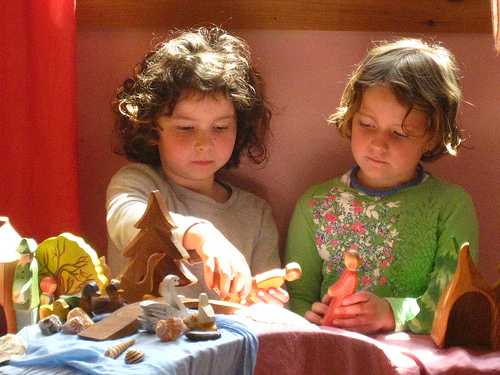This Op-Ed piece from the New York Times comments on the recent curriculum reforms proposed by the Obama administration in support of play. The author, Susan Engel, director of the teaching program at Williams College, articulates what so many educators know, and so few legislators understand.
Op-Ed Contributor – Playing to Learn – NYTimes.com
The statement that really struck me:
“During the school day, there should be extended time for play. Research has shown unequivocally that children learn best when they are interested in the material or activity they are learning. Play — from building contraptions to enacting stories to inventing games — can allow children to satisfy their curiosity about the things that interest them in their own way. It can also help them acquire higher-order thinking skills, like generating testable hypotheses, imagining situations from someone else’s perspective and thinking of alternate solutions.”
As Rudolf Steiner stated, imaginative play in early childhood is the basis for creative thinking later in life. And as all Waldorf early childhood educators know, play is a young child’s work.




4 Comments
Wow, this stirs something deep within me. Thank you for sharing this, I hope its ok, I shared it on my facebook page as well. I hope these changes can happen.
Play is so important, and getting lost in our busy lives. I love the blog! Beautiful and informative. Thanks!!
Thanks for sharing this article. I have long been concerned about our tendency to over organize our children’s lives, both in and out of school. Today children are led from one lesson to the next, from one activity to another, and given precious little time for truly creative pursuits. We have removed most of our children’s need for independent thought, and on the rare occasion they are left to their own devices, they are often disturbed or experience angst, because they do not know how to handle “free time.” Children need time in their day, lots of time, to explore their universe, have new experiences, and to think about things in new ways. How can we expect children to grow up and magically become innovative, when we never gave them time to practice these skills as children?
Unfortunately, too often “grown-ups” view play as wasted time, instead of seeing the higher level skills that evolve in the process. I am hopeful that people will begin to understand the importance of play and free time in a child’s life, and allow for it both at school and at home.
Thanks so much for your comment, Kimara. I completely agree. Parents so often have a fear of their children being bored, but we Waldorf teachers embrace a child’s boredom! If an adult doesn’t interfere and attempt to relieve a child’s “boredom” (often by turning on the TV) it will provide an opportunity for a child to find a creative way to fill his or her time. But we too infrequently give them enough free time in which to be bored!